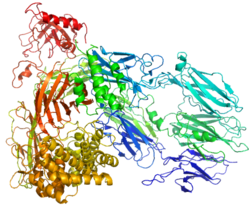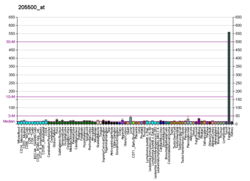Top Qs
Timeline
Chat
Perspective
Complement component 5
Protein found in humans From Wikipedia, the free encyclopedia
Remove ads
Complement component 5 is a protein that in humans is encoded by the C5 gene.[5]
Complement component 5 is involved in the complement system. It is cleaved into C5a and C5b:
- C5a plays an important role in chemotaxis.[6]
- C5b forms the first part of the complement membrane attack complex.
Deficiency is thought to cause Leiner's disease.
Remove ads
Function
Complement component 5 is the fifth component of complement, which plays an important role in inflammatory and cell killing processes. This protein is composed of alpha and beta polypeptide chains that are linked by a disulfide bridge. An activation peptide, C5a, which is an anaphylatoxin that possesses potent spasmogenic and chemotactic activity, is derived from the alpha polypeptide via cleavage with a C5-convertase. The C5b macromolecular cleavage product can form a complex with the C6 complement component, and this complex is the basis for formation of the membrane attack complex, which includes additional complement components.[5]
Remove ads
Clinical significance
Mutations in this gene cause complement component 5 deficiency, a disease where patients show a propensity for severe recurrent infections. Defects in this gene have also been linked to a susceptibility to liver fibrosis and to rheumatoid arthritis.[5]
Therapeutic applications
The drug eculizumab (trade name Soliris) prevents cleavage of C5 into C5a and C5b.[7]
Complement system pathway

References
Further reading
External links
Wikiwand - on
Seamless Wikipedia browsing. On steroids.
Remove ads






